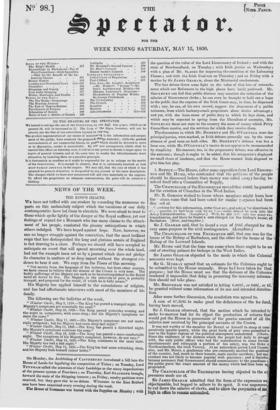On Monday, the Archbishop of CANTERBURY introduced a bill into
the House of Lords for legalizing the composition of Tithes ; on Tuesday, Lord TEYNHAM called the attention of their Lordships to the many imperfections of the present system of Poor-laws ; on Thursday, Earl STANHOPE brought forward the state of the Shipping interest ; on Friday, sundry petitions were received, but they gave rise to no debate. Witnesses in the East Retford case have been examined every evening during the week. The House of Commons was busied with the Supplies 01:l Monday with the question of the value of the Lord Lieutenancy of Ireland ; and with the state of Newfoundland, on Tuesday ; with Irish justice on Wednesday; with a plan of Mr. SLANEY for improving the condition of the Labouring Classes ; and with the Irish Coal-tax on Thursday ; and on Friday with a motion by Sir JAMES GRAHAM, about the Ministerial emoluments.
The last debate threw some light on the value of that love of retrench. ment which our Reformers in the high places have lately professed. Mr. Gour.sunN can feel that public distress may sanction tire reduction of the salaries of Government clerks ; he can even be brought to hold out a hope to the public that the expense of the Irish Court may, in time, be dispensed with ; nay, he can, of his own accord, suggest the abatement of a public nuisance, from which hackney-coach proprietors alone derive advantage ; and yet, with the keen sense of public duty to which he lays claim, and which may be expected to spring from the liberalism of necessity, Mr. GOULBURN dares not state to the country the sums of money which Privy Councillors receive, and the services for which they receive them.
The discussions in which Mr. DOHERTY and Mr. O'CONNELL were the principal parties, were marked, as Irish debates generally are, by the utter absence of good taste on both sides. Mr. DOHERTY'S defence was but a lame one, while Mr. O'Cor•rws tr.'s tactics do not appear to be recommended by simplicity. His manner, too, in the preparatory debate, was offensive in the extreme ; though it ought to be added, that his antagonist's displayed no small share of insolence, and that the House seemed little disposed to give him fair play. •


















